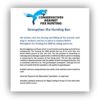Written by Douglas Batchelor on 07 January
It has been an interesting Christmas and New Year, with the hunters in full retreat. Paper after paper  has run with the line that the government are not going to bring the Hunting Act debate back to parliament any time soon – and quite possibly never. Even the Sunday Telegraph, usually such a friend to the hunters, cast doubt on the chances of repeal.
has run with the line that the government are not going to bring the Hunting Act debate back to parliament any time soon – and quite possibly never. Even the Sunday Telegraph, usually such a friend to the hunters, cast doubt on the chances of repeal.
While the hunters have been frustrated by snow and frost, the political commentators have been focussing on the fact that the parliamentary arithmetic does not favour repeal of the Hunting Act and in fact shows that any vote on repeal would be lost.
With repeal of the Hunting Act now in the political long grass, the hunters are wondering what to do. Whatever the Countryside Alliance and ‘Alice in Hunterland’ may say about support for repeal and for hunting, the numbers on the ground are telling a very different story. What we are seeing while monitoring hunts are fewer and fewer supporters and followers, fewer meets and an apparent tightening of the proverbial belt. The hunters’ discussion boards (we monitor them in cyberspace as well) tell the same story: falling support for live quarry hunting, and people saying “we can’t carry on like this”.
The steady procession of hunt staff to court is also undermining the morale and the willingness of hunt staff to do their Masters’ bidding. Acting as a fall guy for a group of people who want to put two fingers up to the law on their fun day out isn’t much fun for the staff when the result is a criminal record, a fine and a legal bill plus all the hassle that goes with becoming a convicted criminal.
Bankers, insurers, professional bodies, and in many cases employers take a very dim view of criminal convictions. For the hunts involved, the legal costs of defending a case can be very significant and their insurers will not be keen to pick up the bill if it turns out that the hunt have in effect supported and or condoned acts of illegality. Certainly for those hunts with a blot on their escutcheon, the cost of insurance will probably rise rapidly and the insurer may well demand staff and management changes before agreeing to provide cover for the hunt for the next season.
Hunt supporters, be they followers or land owners, will be thinking twice before letting hunts with a criminal record onto their land, lest they are charged with knowingly allowing or participating in an illegal activity. For professionals, conviction could lead to their professional standards body taking a view with regard to their fitness to practice if they have a criminal record and their insurer may well refuse professional activities cover. By law insurers are not allowed to provide cover for criminal acts.
However reluctant they may be, what the hunters must now accept is that the Hunting Act is here to stay. Repeal is not on the agenda and won’t happen any time soon, if ever. Continuing to hunt illegally is a high risk strategy. Continuing to train hounds to follow live animal scents is a high risk strategy and to continuously expose staff and supporters to the risk of criminal conviction is not a support winning strategy.
Hunting has always been a high visibility activity. You can’t hide a hunt under a bush. You can’t always hide a hunt with a wild animal in the front of it, in some remote corner of a big estate. What the hunters now have to face is a decision of whether to change to legal trail hunting or simply to give up and turn into a purely social club meeting in the local pub to discuss the tales of years gone by.
To read the full article please follow the link above.






